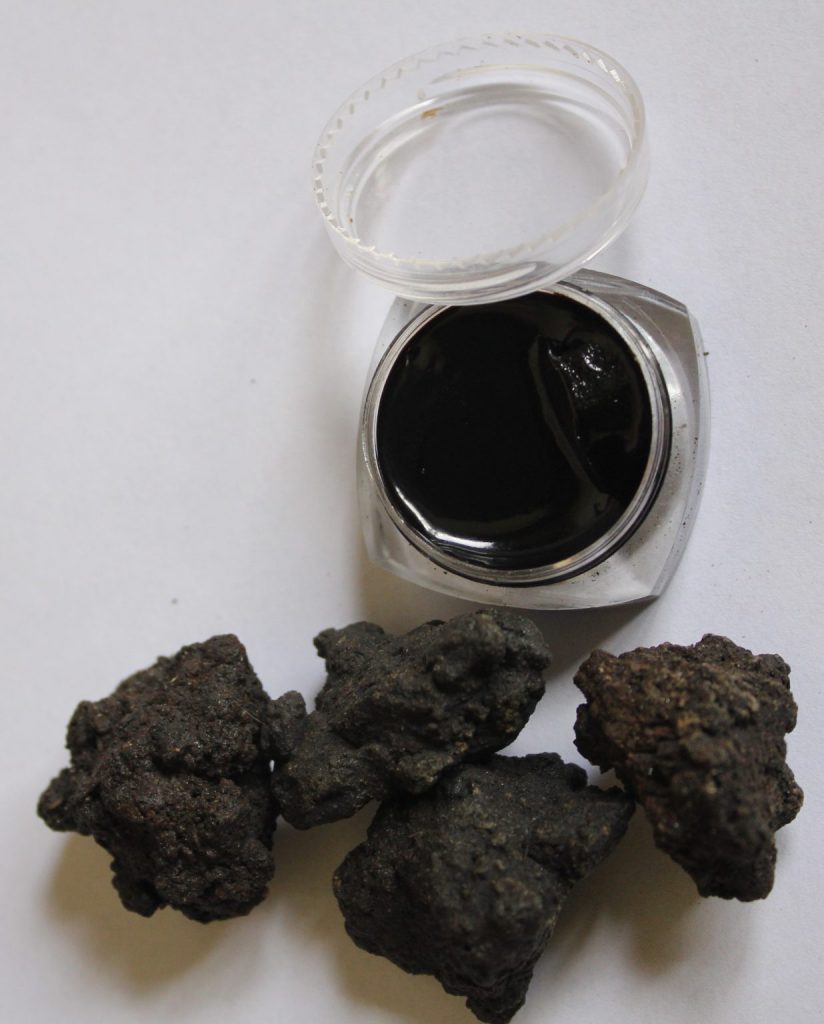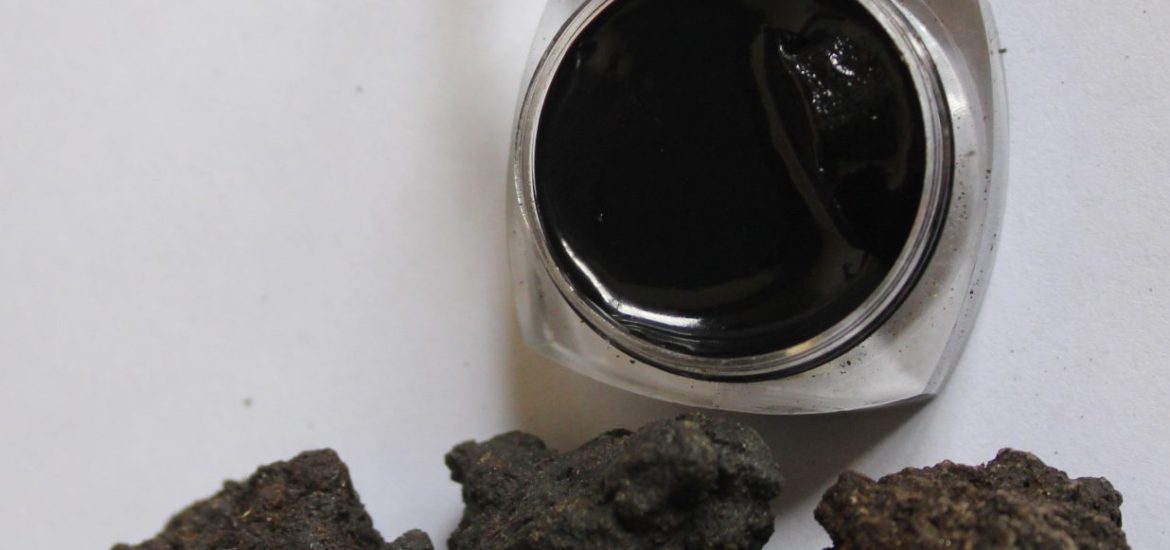Shilajit, a resinous compound prevalent in the Himalayas and other hilly locations, Shilajit for brain health has attracted attention due to its potential neuroprotective properties.
Table of Contents
Shilajit for Brain Health: 9 Brilliant Neuroprotective Effects of Shilajit
There has been a surge in interest in natural therapies and traditional medicines for enhancing brain health and cognitive function in recent years.
Origins and Composition
Shilajit is a sticky, tar-like substance that oozes out of rocks at high altitudes. It is generated over hundreds of years as a result of the decomposition of plant materials, minerals, and microbial activity. Shilajit is made up of a complex blend of organic molecules such as fulvic acid, humic acid, minerals, trace elements, and other bioactive ingredients.
For millennia, Shilajit has been used as a renewing and revitalizing material in traditional Ayurvedic therapy. It is thought to provide multiple health benefits, including boosting brain health and healing a variety of diseases.
Brain Health’s Importance
The brain is a key organ that is in charge of cognitive function, memory, and overall health. Maintaining optimal brain health is essential for leading a happy and rewarding life.
Advantages of Shilajit for Brain Health
Antioxidant Protection
Shilajit contains a high concentration of antioxidants, which help protect the brain from oxidative stress. These antioxidants reduce the danger of cellular damage and promote overall brain health by neutralizing toxic free radicals. Shilajit is well-known for its antioxidant qualities. Antioxidants aid in the neutralization of damaging free radicals that can cause oxidative damage to brain cells. Shilajit for brain health may aid in neuroprotection by lowering oxidative stress.
Neuroprotection
Shilajit may have neuroprotective qualities, assisting in the protection of brain cells from damage and degeneration. It promotes brain function preservation and may lower the risk of neurodegenerative illnesses. Neuroprotection refers to strategies or substances that aid in the protection of the brain against damage and degeneration. Shilajit for brain health entails the preservation of brain cells, the prevention of oxidative stress, the reduction of inflammation, and the promotion of overall brain health.
Cognitive Enhancement
According to research, Shilajit may improve cognitive functions such as memory, attention, and overall mental performance. It may increase neuroplasticity and support neurotransmitter function, resulting in improved cognitive ability. Traditionally, Shilajit has been used for its putative cognitive-enhancing benefits. It has the potential to increase memory, attention, and overall cognitive performance. Although the precise processes are unknown, Shilajit’s capacity to increase neurotransmitter activity and induce neuroplasticity may contribute to its cognitive effects.
Mitochondrial Support
It has been discovered that the use of Shilajit for brain health improves mitochondrial function, which is the energy-producing powerhouse of cells. Shilajit improves overall brain function by optimizing mitochondrial health and supporting brain energy metabolism. Mitochondria are the cell’s powerhouse and play an important role in brain health. Shilajit was discovered to improve mitochondrial function by increasing energy output and decreasing oxidative stress. Healthy mitochondria are required for healthy brain function and defense against neurodegenerative disorders.
Anti-inflammatory Effects
Neurodegenerative illnesses can be exacerbated by chronic inflammation in the brain. Shilajit’s anti-inflammatory effects aid in the reduction of inflammation and the prevention of brain damage, fostering a healthy brain environment. Neurodegenerative illnesses can be exacerbated by chronic inflammation in the brain. Shilajit’s anti-inflammatory qualities may aid in the reduction of inflammation and the prevention of brain damage. Usage of Shilajit for brain health has been demonstrated in studies to decrease the generation of pro-inflammatory chemicals and modify immunological responses in the brain.
Mood Regulation
Shilajit may help regulate mood by changing neurotransmitter levels in the brain. It may aid in the balance of neurotransmitters such as serotonin and dopamine, which are important in mood management and mental well-being.
Stress Reduction
Chronic stress has been shown to have a harmful impact on brain health. Shilajit’s adaptogenic characteristics aid in stress adaptation and promote a more balanced stress response, lowering the likelihood of stress-related cognitive deterioration.
Improved Neurotransmitter Activity
It has been shown that the use of Shilajit for brain health can modify neurotransmitter activity in the brain, potentially improving communication between brain cells. Improved cognitive function, memory, and total brain functioning can result from this.
Increased Blood Flow
The brain requires adequate blood flow to function properly. Shilajit has been proposed to enhance blood circulation, ensuring an appropriate supply of oxygen and nutrients to the brain and thereby maintaining its health and function. Shilajit may have anti-ageing effects on the brain due to its inherent renewing properties. Its antioxidant and neuroprotective effects aid in the prevention of age-related cognitive loss and the promotion of healthy brain aging.
Supporting Evidence
Animal Studies
Several animal studies on Shilajit’s putative neuroprotective properties have yielded promising findings. In one study, rats given Shilajit had better memory and less cognitive deterioration. Another study found that Shilajit protected against toxin-induced brain damage.
Human Studies
While human studies on Shilajit’s neuroprotective properties are limited, certain clinical trials have yielded encouraging results. Shilajit supplementation increased cognitive function, memory, and attention compared to a placebo group in a short trial of healthy elderly people. More study is required to validate these findings and discover the best dosages.
Precautions and Considerations
Sourcing and Quality
Shilajit’s effectiveness and safety are dependent on selecting a high-quality product from reliable providers. Use of Shilajit for brain health should be tested rigorously to verify purity and avoid harmful impurities.
Individual responses to Shilajit may vary depending on factors such as age, overall health, pre-existing medical issues, and drug use. Before beginning any new supplement, it is best to consult a healthcare practitioner, especially if you have underlying health concerns or are taking drugs.
Potential Side Effects
When used in moderation, Shilajit for brain health is generally regarded as harmless. Some people may, however, have negative effects such as stomach pain or allergic reactions. It is advised to begin with a modest dose and monitor any unwanted responses.
Conclusion
Shilajit shows promise as a natural treatment for brain health and may have neuroprotective properties. While further research is needed to determine its efficacy and optimal application, preliminary studies indicate antioxidant, anti-inflammatory, and cognitive-enhancing qualities. As with any supplement, it should be used carefully and in consultation with a healthcare practitioner. A comprehensive approach to brain health, including a well-balanced diet, frequent exercise, mental stimulation, and social involvement
It is critical for sustaining peak brain function throughout life. Shilajit has many brain health benefits, including antioxidant protection, neuroprotection, cognitive enhancement, and mood control. Its abilities to promote mitochondrial function, reduce inflammation, and boost neurotransmitter activity all contribute to overall brain health and vitality. While more research is needed to fully understand its mechanisms and optimal application, Shilajit shows promise as a natural supplement for improving and sustaining brain function throughout life.


